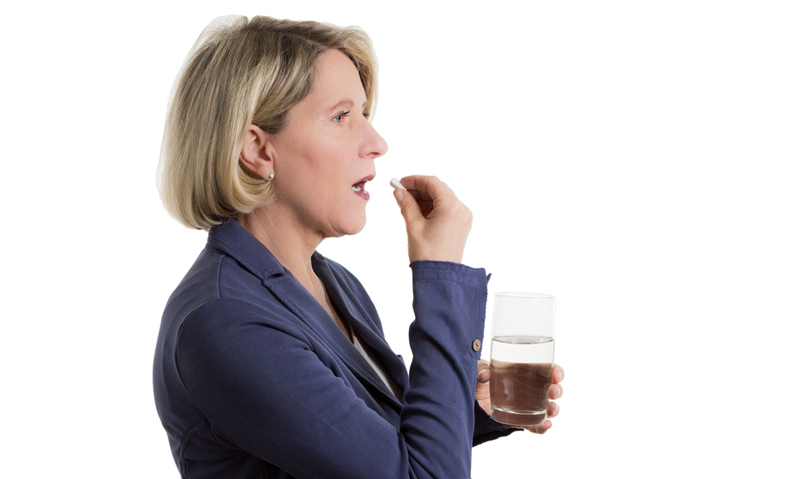COMPLEMENTARY and alternative medicines to treat menopausal symptoms must be subject to tighter regulation and more extensive research, according to a leading women’s health expert.
Associate Professor John Eden, a gynaecologist and reproductive endocrinologist at the Women’s Health and Research Institute of Australia, told MJA InSight that a similar concept to the Heart Foundation’s Tick program could be developed to ensure complementary and alternative medicine (CAM) treatments were standardised and evidence-based.
“We could apply this to the CAM industry in the form of a ‘green tick’, which would focus on the safety, efficacy and quality control of products.”
Professor Eden was responding to an MJA study that found that Australian women at midlife were using CAMs for managing vasomotor symptoms (VMS) of menopause despite insufficient evidence to support their use. (1)
The research included 2020 women aged 40–65 years who completed questionnaires about their use of CAMs for VMS and other menopausal symptoms. Most of the women were postmenopausal, resided in metropolitan areas and were born in Australia.
The authors found the prevalence of CAM use for VMS was 13.22%, with phytoestrogens most commonly used, followed by evening primrose oil and ginseng.
Compared with premenopausal women, perimenopausal and early postmenopausal women were more likely to use any CAM for VMS. The prevalence of use of CAMs for other symptoms was 32.23%, with fish or krill oil most commonly used, followed by glucosamine.
The authors said their findings indicated that “health care providers need to actively guide women in the management of VMS and other menopausal symptoms”.
More judicious use of supplements such as fish oil and glucosamine, particularly among older women, was needed until their efficacy and safety profiles were better understood, they wrote.
Professor Eden said that women had “always turned to CAM to manage their menopausal symptoms, and there’s no evidence that this number has increased in recent years”.
“When I talk to my patients, they say to me ‘Menopause is natural, so can’t I use something natural to treat it?’ ”
He said that for the safety of patients, the CAM industry must be made more transparent, as many over-the-counter products sold were only placebos.
Tighter regulations and a “green tick” approach would be well received because “patients already want to get better direction on CAMs”.
Professor Martha Hickey, director of the Women’s Gynaecology Research Centre at the Royal Women’s Hospital, Melbourne, agreed that tighter regulation of the CAM industry was needed, but said it was important to recognise there was no “cookie cutter” approach to treating VMS.
“It’s become fashionable to say that all CAMs are rubbish”, she told MJA InSight. “But the fact is, women are worried about [potential side effects of] hormone replacement therapy — and rightfully so.”
Professor Eden said all CAM products on the market should be backed up by scientific research, which would also encourage consistency in the content of herbal drugs.
However, he said making these changes a reality would not be easy. “The CAM industry probably would not want a green tick system … so it would have to be an independent or academic group that leads the change.”
He said that if Australia could “get it right on this issue, we could become the leaders in our region”.
Professor Hickey said that more research was required not just on the efficacy of CAMs, but into the mechanisms behind menopausal symptoms, because “we still don’t even know what causes hot flushes”.
She said the lack of evidence made it difficult for doctors to negotiate the risks of hormone replacement therapy on one hand and the appealing option of CAMs on the other, when talking to their patients.
“As clinicians we need to listen to our patients, and not be judgemental or have an attitude about their choices. If we rubbish their concerns, women are more likely to turn to CAMs.”
Professor Hickey said that, ultimately, “doctors need to be prepared to admit what we don’t know about menopause”.
(Photo: Agenturfotografin / shutterstock)

 more_vert
more_vert
I agree with Professor Hickey on many points, particularly as she stresses the need to listen to patients, not ostracise and patronise them. Certainly quality of any and all medicinal products is vastly important and must constantly be reviewed and improved. However, an issue I find particularly concerning is that these women are self-prescribing with herbal and nutritional medicines and it seems that their doctors are not sure how to advise them. Perhaps we might consider that there are appropriately educated, trained and registered naturopaths and herbalists who would be able to offer more advice in this area and direct patients to seek that advice rather than self-prescribe.
It’s certainly of concern that allegedly therapeutic products can be sold with unverified claims but even worse, from a consumer point of view, that some products can;t even be shown to contain the ingredients listed on the bottle. Homeopathic “remedies” are the prime example. How is one to know if the little bottle of water, or sugar “pillules” used to contain Nat Mur or used to contain Arnica? These products appear on pharmacy shelves.
Fantastic ‘green tick’ idea Professor John Eden! Women need information about the most and least effective and safe alternative treatments for menopausal symptoms. And yes the information should be transparent and independent coming from a complementary medicine research centre at a university with a track record in the investigation of effectivness and safety of complementary medicines in Women’s health rather than from industry with vested interests. Thanks for highlighting the survey findings and women’s health information needs.
Teaching patients self-hypnosis or visualisation has shown to be effective. Yet I have rarely heard of a doctor who refers a patient for this non-side effect therapy to see if it is able to help their patient.
http://www.sciencedaily.com/releases/2012/10/121024111526.htm
http://www.nicabm.com/nicabmblog/patients-unbearable-hot-flashes-cool-hypnosis/